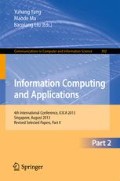Abstract
This paper describes a use of ARM processors STM32F407ZET6’s and MIDI music generator hardware and software design and implementation, STM32F407ZET6 communicate with the host computer through serial ports, and the cpu can access and quickly identify the vocal baseband data, and finally convert it to a MIDI sound chip that can recognize MIDI message, so that the MIDI sound source and vocal fundamental frequency corresponding to the different sounds of electronic tones.
Access this chapter
Tax calculation will be finalised at checkout
Purchases are for personal use only
Preview
Unable to display preview. Download preview PDF.
References
Cheng, Y., Wan, M., Liu, Y., Wu, S.: Programmable music generator design. Chongqing Institute of Technology (Natural Science Edition ) (April 2008)
Cheng, Z.X., Shen, J.O.: From relational space to Euclidean space. Changzhou Institute of Technology (March 2005)
Zhong industry: PLD technology to develop new trends. Electronics World (August 2001)
Tao, J., Zhu, P.C.: Computer optical music recognition technology. Popular Science (August 2005)
Ling, X.: Editing Songs played Design. Electronic world (October 2003)
Jie, G., Ming, Y.: Weighted Hausdorff distance based on spatial face recognition algorithm. Hebei University of Technology (June 2004)
Bin, Z.: PIC16C5X Microcontroller with music theory and method. North China Institute of Technology (March 2002)
Ma, J., Chen, L.C., Zhang, Y.: Contour tracking and edge detection image recognition. North University of China ( Natural Science Edition ) (May 2006)
Wang S., Kangrun: Simple music generator with CPLD. Jiaozuo Institute of Technology (Natural Science Edition ) (February 2001)
Mao, H., Ma, Y., Zhou, Y., Xiong, P.: Face Recognition Algorithms - Multiple orthogonal projection based on the image and the minimum distance classifier class. Computer Engineering and Applications 27 (2005)
Lao, L.: Thermostat based on CPLD chip design. Guangxi University of Technology (April 2002)
Qi, U.: CPLD-based pseudo-random sequence generator. Electronic Design & Application (November 2003)
Qi, U.: CPLD- based pseudo-random sequence generator. Modern Electronics Technique (March 2004)
Bo, Yi, D.S., Wang, D.: CPLD in the circuit board fault diagnosis. Microcomputer Information (March 2002)
Jiang, L.: CPLD in passive jamming equipment application. Optoelectronic confrontation with passive interference (January 2002)
Zhou Y., Yang L.: With CPLD digital system controller. North China Institute of Aerospace Engineering (2001) -S1
Liu, Y.A., Wu, H.: EDA experimental platform for the design and application. Electronics Engineers (December 2003)
Song, G.: Zhang T.H., Jiang H.: Digital circuits in VHDL synthesis technology. Modern Computer (March 2001)
Shen, H.: CPLD digital circuit experiment system design. China Educational Technology Equipment (June 2006)
Huang post macros, Ping, S.: CPLD-based EDA innovative experimental box design application. Laboratory Science (February 2011)
Chen, J.: EU introduced regulations music player limit. Chinese abroad Times (2009)
Liu, W.: Magnificent nine days, general manager. Vigorously develop the characteristics of domestic EDA tools. China Electronics News (2011)
Liang, H.: China EDA strategy seminar held in Beijing. China Electronics News (2009)
Yang, S.: Jinan ICC Development Center IC Division. Jinan: 12 in. line and EDA are two key. China Electronics News (2010)
High, J.: Altera out MAX II series CPLD. Electronic Information Times (2004)
Chen, S.: Music Player: from “talking “to” intelligent ”. Chinese Culture Daily (2010)
PLAYGAMER.COM; ’s most popular music player WINAMP China Computer Newspaper (2000)
Hunan leaf; Built-in hard drive, portable music player “iPod” newsletters (2002)
Degen, G.G.: AVR and CPLD development combining experimental platform. Newsletters (2003)
Li, M.: iPod iTunes model can domestic flowering. China Press reported (2009)
Author information
Authors and Affiliations
Editor information
Editors and Affiliations
Rights and permissions
Copyright information
© 2013 Springer-Verlag Berlin Heidelberg
About this paper
Cite this paper
Guo, X. (2013). MIDI Music Generator Based on STM32. In: Yang, Y., Ma, M., Liu, B. (eds) Information Computing and Applications. ICICA 2013. Communications in Computer and Information Science, vol 392. Springer, Berlin, Heidelberg. https://doi.org/10.1007/978-3-642-53703-5_13
Download citation
DOI: https://doi.org/10.1007/978-3-642-53703-5_13
Publisher Name: Springer, Berlin, Heidelberg
Print ISBN: 978-3-642-53702-8
Online ISBN: 978-3-642-53703-5
eBook Packages: Computer ScienceComputer Science (R0)

